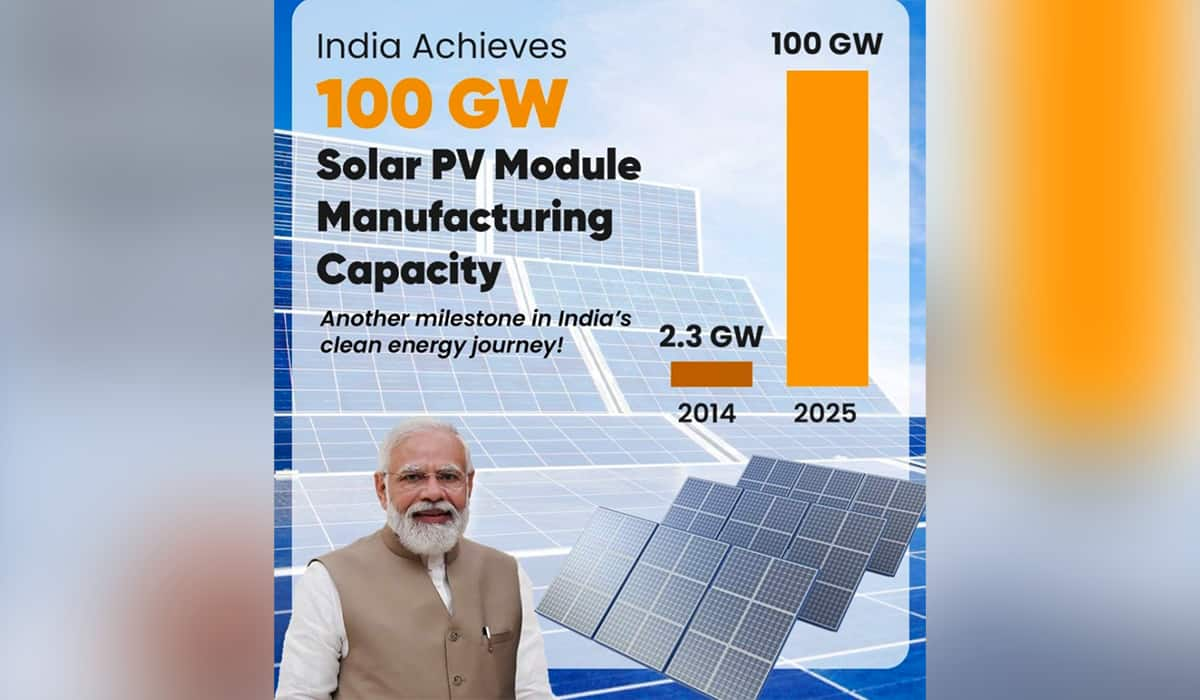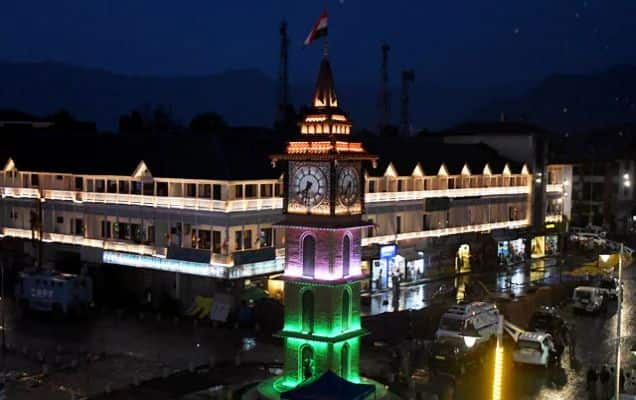Prime Minister of Mauritius Shri Pravind Kumar Jugnauth ji, Director General of World Health Organisation Dr. Tedros, Chief Minister of Gujarat Shri Bhupendra Bhai Patel, my Cabinet colleagues Shri Sarbananda Sonowal ji, Dr. Mansukh Mandaviya ji, Shri Munjpara Mahendrabhai, other dignitaries present here, ladies and gentlemen!
Today, all of us are witnessing a grand event for health and wellness all over the world. I am extremely grateful to the Director General of WHO Dr Tedros. I profusely thank Dr. Tedros on behalf of every Indian for his words of praise for India. And I especially congratulate him for the way he has made a confluence of Gujarati, Hindi and English and has touched the hearts of every Indian. My relationship with Dr. Tedros is quite old and whenever we meet he always mentions with great pride and joy about the manner in which Gurus from India had taught him. He expresses his feelings with a lot of joy. And the love he has for India is manifesting today in the form of an institution. He told me - "It is my child and I am giving it to you; now it is your responsibility to nurture it". I assure Dr. Tedros that the trust with which you have given this responsibility to India and the enthusiasm with which our Chief Minister Bhupendra Bhai Patel has taken this entire responsibility on his shoulder, I am sure that we will certainly fulfil your expectations.
I also express my gratitude to my dear friend and Prime Minister of Mauritius Shri Jugnauth ji. I have also had a relationship with his family for almost three decades. Whenever I went to Mauritius, I would visit his house, meet his father. I have a very close bond with his family which is almost three decades old and I am glad that today on my invitation he has come to my home state Gujarat. And he too has won the hearts of all of us by connecting with Gujarat and Gujarati language. We just heard the views of the Prime Minister of Bangladesh, the Prime Minister of Bhutan and the Prime Minister of Nepal. Everyone has extended his/her best wishes to WHO Global Centre for Traditional Medicine. I am grateful to all of them.
Friends,
WHO has entered into a new partnership with India in the form of this Centre for Traditional Medicine. It is recognition of both India's contribution and India's potential in the field of traditional medicines. India is taking this partnership as a huge responsibility to serve the entire humanity. This Centre, in collaboration with traditional medicine spread across the world, will help in providing better medical solutions to the people around the world. And I would also like to say in the presence of Dr. Tedros and Pravind ji on the land of Jamnagar, it is not just a foundation stone laying ceremony for a building or an institution. Today I wish to tell all those around the world who believe in naturopathy and traditional medicines that as India is celebrating the 'Azadi Ka Amrit Mahotsav', the foundation stone that has been laid during this period has started the era of traditional medicines for the coming 25 years across the world.
I can see before my eyes that in the coming 25 years due to the increasing interest towards holistic healthcare, when the country will be celebrating the centenary of independence, the traditional medicines will become a Centre of utmost importance for every family around the world; and today the foundation stone is being laid for the same. And in Ayurveda, Amrit Kalash has a great importance; and this programme is starting in the Amrit Kaal. So I can foresee some far-reaching effects with a new belief. Personally, I feel extremely delighted for this Global Centre is being established in our Jamnagar. Jamnagar has a special relationship with Ayurveda. More than five decades ago, the world's first Ayurveda University was established in Jamnagar. Here we have one of the best Ayurveda Institutes i.e. the Institute of Teaching and Research in Ayurveda. Now this Global Centre of the World Health Organization will give a new height to Jamnagar's identity in the field of wellness at the global level. Staying disease free can be an important part of life's journey, but wellness should be the ultimate goal.
Friends,
We have realized the importance of wellness in our lives during the covid pandemic. That is why the world is looking for a new dimension of health care delivery today. I am glad that WHO has taken forward this vision of India's 'One Earth, One Health' by picking this year's theme as "Our planet, our health".
Friends,
It has been said in the Atharva Veda, composed thousands of years ago - जीवेम् शरद: शतम्। That is, live for 100 years! In our tradition, wishing one to live for 100 years has been very common, because attaining the age of 100 in those days was not a big deal. And our traditional medicine practices played a major role in this. Traditional medicine of India is not limited to just treatment. It is a holistic science of life. Many of you know that apart from healing and treatment in Ayurveda, social health, mental health, happiness, environmental health, compassion, empathy, sensitivity and productivity too are included in this 'Amrit kalash'. That is why Ayurveda is considered as the knowledge of life. And Ayurveda is also known as the fifth Veda and has the same importance just like the four Vedas.
Friends,
Today, our traditional knowledge is crucial to overcome the lifestyle-related newer diseases of the modern world. For example, good health is directly related to a balanced diet. Our ancestors believed that half the cure for any disease lay in a balanced diet. Our traditional medicine practices are full of information about what to eat and what not to eat in each season. And the basis for this information is the compilation of hundreds of years of experience. For example, there was a time in India when our elders used to put a lot of emphasis on the use of millets or coarse grains. Over a period of time, we have seen its use decreasing. However, once again we are seeing the demand for millets increasing today. I am glad that India's proposal to promote the use of millets has been accepted by the United Nations. Declaring the year 2023 as the International Year of Millets is a very beneficial step for humanity.
Excellencies,our ancient and traditional teachings have been kept in mind in the 'National Nutrition Mission' started in India sometime back. We used the AYUSH system extensively even during the COVID-19 pandemic. Ayurveda based decoction became very popular with the name “Ayush Kadha”. There is also a lot of demand globally for Ayurveda, Siddha, Unani formulations. Today many countries of the world are emphasizing on the use of traditional herbal systems to prevent pandemic.
Friends,
India considers it its responsibility to share with the world her experiences in the field of Ayurveda and Integrative Medicine. The Yoga tradition of India is helping the world a lot in fighting many diseases like Diabetes, Obesity and Depression. Yoga is becoming popular through International Day of Yoga, and is helping people around the world to reduce stress and to create a mind-body-consciousness balance. It is imperative that this new institution plays a pivotal role in expanding the scope of yoga.
Excellencies,
On this occasion today, I would also like to set five goals for this Global Centre. The first goal is to cull traditional knowledge using technology to create a database. Traditional medicine has different traditions in different countries. A global repository should be created in this Centre compiling these traditions. This Centre can also make a compilation after studying the sources of these traditions and interacting with the original practitioners. It is essential to do this so that the important knowledge of traditional medicines from different countries can continue to benefit the generations to come.
Friends,
The GCTM should also create international standards for the testing and certification of traditional medicines. This could be another goal of your organization. This will increase the trust of people in every country in these medicines. We have seen that several traditional medicines of India are found very effective even by foreigners. But due to lack of global standards, its regular business remains limited. Hence availability of these medicines is also less. I believe many other countries are also facing similar challenges. This Global Centre should also work towards its solution. WHO has also recently prepared Benchmark Documents for Ayurveda, Panchakarma and Unani. It also needs to be expanded.
GCTM should also create a platform where experts from the world's traditional systems of medicine can come together and share their experiences. This global Centre can set this as its third goal. Can this institute hold an annual function or an annual traditional medicine festival in which experts from maximum number of countries around the world can contemplate, deliberate and share their methods?
Friends,
The fourth goal of this Centre, I believe, should be to invest in research. GCTM should mobilize funding for research in traditional medicines. We see that billions of dollars are used in the research area for modern pharma companies. We should also raise similar resources for research in traditional medicines. The fifth goal is related to the treatment protocol. Can GCTM develop holistic treatment protocols for certain specific diseases in which the patient benefits from both modern and traditional medicines? Effective integration of these ancient disciplines in your healthcare systems can help in fighting several diseases.
We Indians are people who believe in 'Vasudhaiva Kutumbakam' and 'Sarve Santu Niramayah' and live with this spirit. 'The whole world is one family and may this family always be healthy' - this has been our philosophy. Today this tradition of India is getting enriched with the establishment of WHO-GCTM. I conclude with the wish that this WHO Centre will improve the health of people around the world. And now, I express my heartfelt gratitude to both the guests for sparing their time, for adding glory to this ceremony and making the event more relevant. Once again thanks a lot to all of you. Namaskar!




























